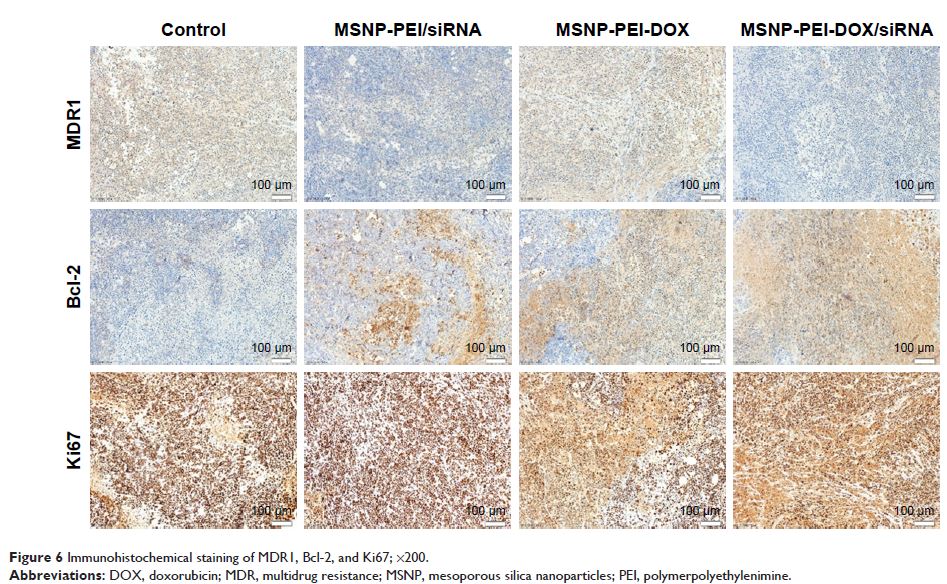108384
论文已发表
注册即可获取德孚的最新动态
IF 收录期刊
- 3.4 Breast Cancer (Dove Med Press)
- 3.2 Clin Epidemiol
- 2.6 Cancer Manag Res
- 2.9 Infect Drug Resist
- 3.7 Clin Interv Aging
- 5.1 Drug Des Dev Ther
- 3.1 Int J Chronic Obstr
- 6.6 Int J Nanomed
- 2.6 Int J Women's Health
- 2.9 Neuropsych Dis Treat
- 2.8 OncoTargets Ther
- 2.0 Patient Prefer Adher
- 2.2 Ther Clin Risk Manag
- 2.5 J Pain Res
- 3.0 Diabet Metab Synd Ob
- 3.2 Psychol Res Behav Ma
- 3.4 Nat Sci Sleep
- 1.8 Pharmgenomics Pers Med
- 2.0 Risk Manag Healthc Policy
- 4.1 J Inflamm Res
- 2.0 Int J Gen Med
- 3.4 J Hepatocell Carcinoma
- 3.0 J Asthma Allergy
- 2.2 Clin Cosmet Investig Dermatol
- 2.4 J Multidiscip Healthc

介孔二氧化硅纳米粒子 - 聚乙烯亚胺聚合物用于多柔比星和 MDR1-siRNA 的共同递送,以改善口腔鳞癌的治疗
Authors Wang D, Xu X, Zhang K, Sun B, Wang L, Meng L, Liu Q, Zheng C, Yang B, Sun H
Received 1 September 2017
Accepted for publication 13 November 2017
Published 28 December 2017 Volume 2018:13 Pages 187—198
DOI https://doi.org/10.2147/IJN.S150610
Checked for plagiarism Yes
Review by Single-blind
Peer reviewers approved by Dr Govarthanan Muthusamy
Peer reviewer comments 2
Editor who approved publication: Dr Lei Yang
Abstract: Oral cancer is a type of head and neck cancer that is the seventh most
frequent cancer and the ninth most frequent cause of death globally. About 90%
of oral cancer is of squamous cell carcinoma type. Surgery and radiation with
and without chemotherapy are the major treatments for oral cancer. Better advanced
treatment is still needed. Multidrug resistance plays an important role in
failure of oral cancer chemotherapy. In this study, we tried to fabricate a
novel nanoparticle that could carry both MDR1-siRNA to block MDR1 expression
and doxorubicin (DOX), a chemotherapy drug, into cancer cells in order to
directly kill the cells with little or no effect of multidrug resistance.
Results showed that mesoporous silica nanoparticles (MSNP) can be modified by
cationic polymerpolyethylenimine (PEI) to obtain positive charges on the
surface, which could enable the MSNP to carry MDR1-siRNA and DOX. The
transfection efficiency assays demonstrated that the MSNP-PEI-DOX/MDR1-siRNA
was efficiently transfected into KBV cells in vitro. KBV cells transfected with
MSNP-PEI-DOX/MDR1-siRNA could effectively decrease gene expression of MDR1 (~70% increase after 72
hours posttreatment) and induce the apoptosis of KBV cells (24.27% after
48 hours posttreatment) in vitro. Importantly, MSNP-PEI-DOX/MDR1-siRNA
dramatically reduced the tumor size (81.64% decrease after 28 days
posttreatment) and slowed down tumor growth rate compared to the control group
in vivo (P <0.05). In the aggregate,
newly synthesized MSNP-PEI-DOX/MDR1-siRNA improves cancer chemotherapy effect
in terms of treating multidrug-resistant cancer compared to DOX only, clearly
demonstrating that MSNP-PEI-DOX/MDR1-siRNA has potential therapeutic
application for multidrug-resistant cancer in the future.
Keywords: oral squamous
carcinoma, doxorubicin, MDR1, mesoporous silica nanoparticles,
polymerpolyethylenimine
